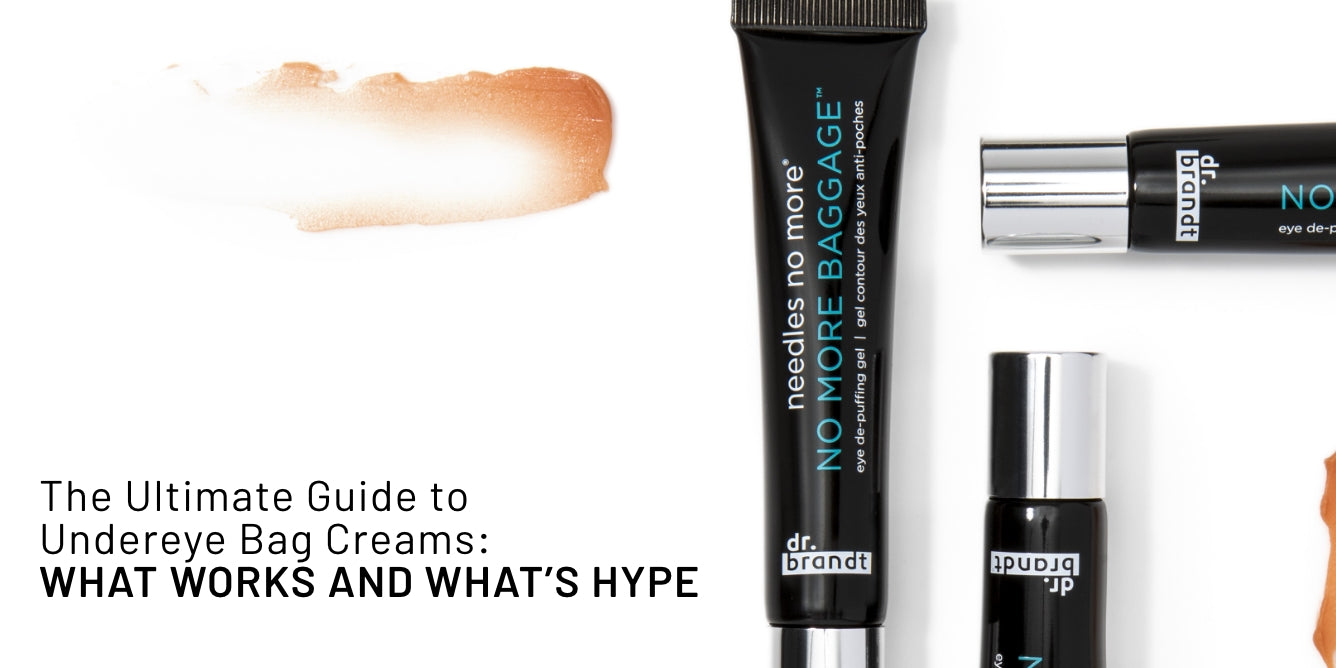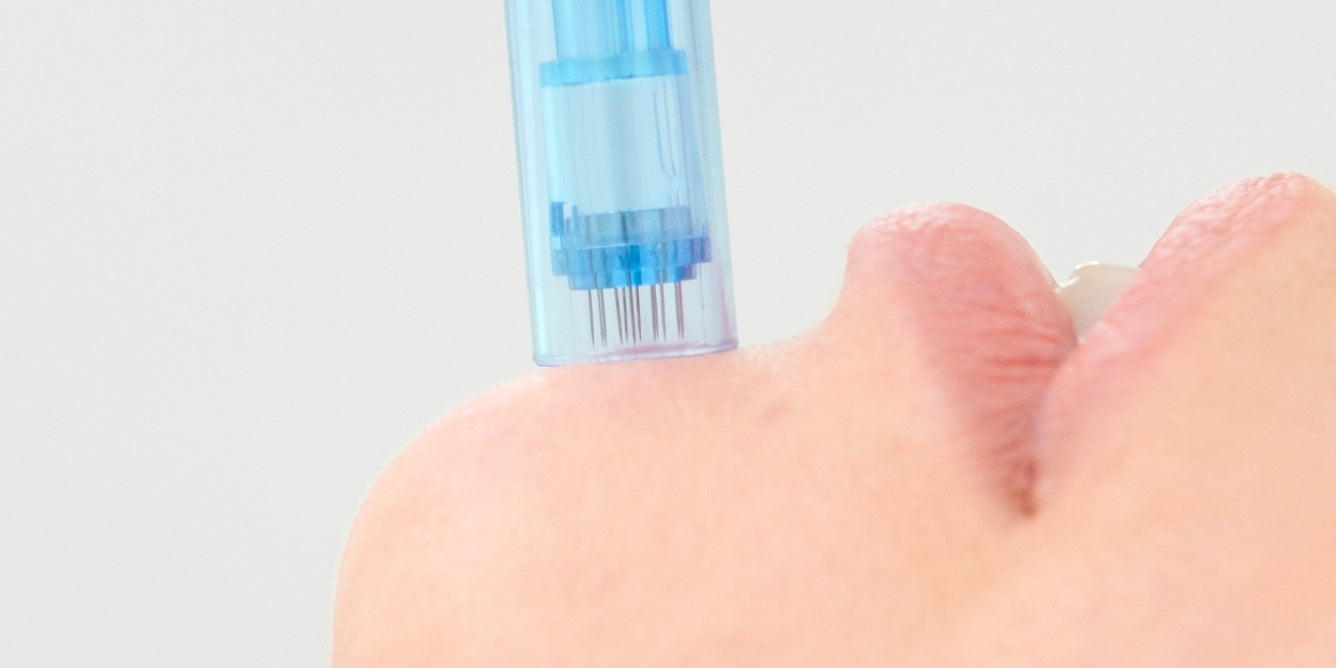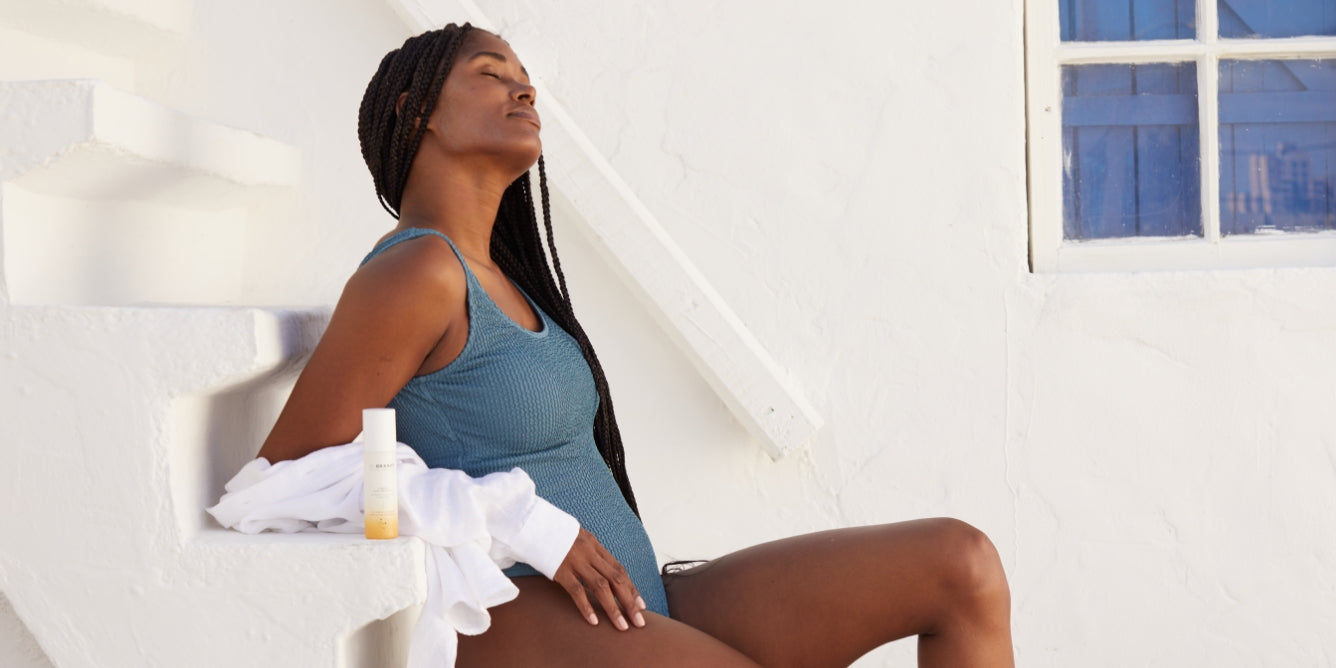
As within, so without: at Dr. BRANDT, our work has always been guided by the principles of integrative dermatology. Simply put, this is the idea that body and mind are intimately linked—and few things make the close ties between the two more obvious than stress. From acne breakouts to eczema flare-ups, to ‘stress rash’, several studies have demonstrated a strong relationship between psychological stress and skin disorders. Below, Dr. Katlein Franca, MD, Ph.D., and a key member of our Skincare Advisory Board provides insight into the relationship between mental health and common skin problems and offers her advice on how to cope.
How does stress cause skin problems?
When faced with a stressful situation - real or imagined - the body starts activating neuroendocrine systems that release different hormones to enable the organism to adapt to the stress or fight against it. This stress response can have different consequences not just on your physical health, but on your skin. (1) By affecting your hormones or wearing down your immune system, stress can exacerbate skin diseases and vice versa, resulting in a vicious cycle that can significantly impair a patient's quality of life. (2)
What skin conditions are triggered or exacerbated by stress and anxiety?
Eczema (atopic dermatitis)
Atopic dermatitis is a long-lasting skin disease that causes dry, itchy, and red skin, and tends to flare periodically. Stress is a trigger and aggravator of AD. (3,4) Adult patients with AD tend to be more anxious than individuals without this skin condition. - (5) Family and relationship stress, low self-esteem, and issues in psychosocial adjustment have been noted among individuals diagnosed with atopic dermatitis. (6)
Psoriasis
Psoriasis is a chronic and inflammatory skin disease that causes red, scaly patches and itchy plaques, most commonly affecting the knees, elbows, scalp, and torso. Studies show that stress can cause the release of hormones that trigger inflammation, leading to psoriasis flare-ups. Of course, the relationship goes both ways as psoriasis outbreaks are often a source of stress. (7)
Acne
Stress triggers or worsens acne through different mechanisms. Chronic stress increases the secretion of hormones such as adrenal androgens and cortisol, resulting in the production of sebum that can block the follicle and lead to bacterial proliferation, causing inflammation, redness, and pustules (pimples). (11) Stress also contributes to inflammation, which is an essential component in the development of acne. Furthermore, psychological stress impairs wound healing, which could delay the repair of the acne lesions. (12)

Rosacea
Rosacea is a chronic skin condition characterized by facial redness and inflammatory lesions. (13) Common triggers include heat, stress, alcohol, and spicy foods. When stressed, patients with rosacea produce greater nerve, blood flow, and sweating responses than people without the disease, which causes facial flushing and inflammation. (14) Rosacea can be a stigmatizing disease, and the individuals affected may develop social anxiety and depression that in turn worsens the condition.
Urticaria (Hives)
Urticaria, also known as hives, is an outbreak of itchy rash with swollen, pale red bumps or plaques. It can be triggered by allergens, medications, food, insect bites, and so on. Stress can also lead to or exacerbate urticarial wheals, as well as itch intensity. (15) Certain patients with urticaria often report experiencing significant stress just before the onset of the lesions.
Different ways to manage stress and anxiety
The skin is the largest organ of the human body—as well as the only visible one. As a result, skin diseases have a notable psychological and social impact on those affected by them. (19) As a result, stress management is a very important aspect of the treatment of skin conditions. Learning to identify your stressors can be a helpful coping mechanism. If you feel overwhelmed by stress or anxiety, or suspect you may be depressed, a licensed therapist can help put things in perspective and offer ways to cope. Otherwise, here are a few practical ways to manage stress on your own:
DECREASE SUGAR CONSUMPTION
Refined carbohydrates or foods rich in sugar high induce peaks in insulin levels leading to inflammation in the body, which of course affects the skin. Concerned about aging gracefully? Be aware that high glucose levels are directly connected to skin aging. (20)
AVOID ALCOHOL
Certain skin disorders are more common in heavy drinkers, particularly psoriasis, discoid eczema, and superficial infections. Alcohol can also trigger rosacea. (21,22)
KICK THE HABIT
Aside from being one of the most harmful lifestyle habits out there, smoking causes significant skin changes, accelerates aging, and intensifies the course of many skin diseases, including skin cancer. It can also degrade your skin’s microbiome, the community of microorganisms that keep it healthy. It has been observed that the skin of 40-year-old smokers resembles that of a 70-year-old. (24)
EXERCISE, YOGA, AND MINDFULNESS
Several studies indicate that mental health can be enhanced by low- or moderate-intensity activity. (26) Yoga in particular - which encompasses physical postures, breathing exercises, meditation, or mindfulness - improves anxiety and stress and improves the quality of life and self-rated sleep quality. (27) For increased stress relief, consider adopting some relaxation techniques, or a mindfulness practice. This could be as simple as observing your breath for five minutes each morning or evening.

ADAPT YOUR SKINCARE ROUTINE
For everyone - but particularly those with flaky, irritated, or itchy skin, keeping your skin adequately moisturized is crucial to avoid dry skin. Why? Dry skin not only exacerbates skin conditions like psoriasis or eczema; it can also make acne worse by triggering excessive sebum production. An effective, basic skincare routine includes protection, prevention, cleansing, and moisturizing. Unsure where to start? Dermatologists can help you to identify the best products for your skin type and concerns. With an increased number of skincare products released in the market, it’s important to do your research. Look for clinically-proven ingredients for your specific skin concern, and above all, be consistent with your routine. (29)

CULTIVATE GOOD SLEEP
During sleep, the blood flow to skin increases, and growth hormones stimulate collagen synthesis, reducing wrinkles. A study in the journal Clinical and Experimental Dermatology found that people who slept seven to nine hours reported a significantly better perception of their appearance and physical attractiveness. Also, their skin could protect and heal itself better after being exposed to ultraviolet light compared to those who slept five hours or less. (30)
REFERENCES
1- Bin Saif GA, Alotaibi HM, Alzolibani AA, et al. Association of psychological stress with skin symptoms among medical students. Saudi Med J. 2018;39(1):59-66. doi:10.15537/smj.2018.1.21231
2- Kimyai-Asadi A, Usman A. The role of psychological stress in skin disease. J Cutan Med Surg. 2001 Mar-Apr;5(2):140-5. doi: 10.1007/BF02737869. Epub 2001 Feb 28. PMID: 11443487.
3- Morren MA, Przybilla B, Bamelis M, Heykants B, Reynaers A, Degreef H. Atopic dermatitis: triggering factors. J Am Acad Dermatol. 1994 Sep;31(3 Pt 1):467-73. doi: 10.1016/s0190-9622(94)70213-6. PMID: 8077475.
4- Suárez AL, Feramisco JD, Koo J, Steinhoff M. Psychoneuroimmunology of psychological stress and atopic dermatitis: pathophysiologic and therapeutic updates. Acta Derm Venereol. 2012;92(1):7-15. doi:10.2340/00015555-1188
5- Hashizume H, Horibe T, Ohshima A, Ito T, Yagi H, Takigawa M. Anxiety accelerates T-helper 2-tilted immune responses in patients with atopic dermatitis. Br J Dermatol. 2005 Jun;152(6):1161-4. doi: 10.1111/j.1365-2133.2005.06449.x. PMID: 15948976.
6- Bockelbrink A, Heinrich J, Schäfer I, Zutavern A, Borte M, Herbarth O, Schaaf B, von Berg A, Schäfer T; LISA Study Group. Atopic eczema in children: another harmful sequel of divorce. Allergy. 2006 Dec;61(12):1397-402. doi: 10.1111/j.1398-9995.2006.01186.x. PMID: 17073868.
7- Rousset L, Halioua B. Stress and psoriasis. Int J Dermatol. 2018 Oct;57(10):1165-1172. doi: 10.1111/ijd.14032. Epub 2018 May 4. PMID: 29729012.
8- Molina-Leyva A, Almodovar-Real A, Carrascosa JC, Molina-Leyva I, Naranjo-Sintes R, Jimenez-Moleon JJ. Distribution pattern of psoriasis, anxiety and depression as possible causes of sexual dysfunction in patients with moderate to severe psoriasis. An Bras Dermatol. 2015;90(3):338-345. doi:10.1590/abd1806-4841.20153254
9- Bhosle MJ, Kulkarni A, Feldman SR, Balkrishnan R. Quality of life in patients with psoriasis. Health Qual Life Outcomes. 2006;4:35. Published 2006 Jun 6. doi:10.1186/1477-7525-4-35
10- Kucharska A, Szmurło A, Sińska B. Significance of diet in treated and untreated acne vulgaris. Postepy Dermatol Alergol. 2016;33(2):81-86. doi:10.5114/ada.2016.59146
11- Zari S, Alrahmani D. The association between stress and acne among female medical students in Jeddah, Saudi Arabia. Clin Cosmet Investig Dermatol. 2017;10:503-506. Published 2017 Dec 5. doi:10.2147/CCID.S148499
12- Kiecolt-Glaser JK, Marucha PT, Malarkey WB, Mercado AM, Glaser R. Slowing of wound healing by psychological stress. Lancet. 1995 Nov 4;346(8984):1194-6. doi: 10.1016/s0140-6736(95)92899-5. PMID: 7475659.
13- Heisig M, Reich A. Psychosocial aspects of rosacea with a focus on anxiety and depression. Clin Cosmet Investig Dermatol. 2018;11:103-107. Published 2018 Mar 6. doi:10.2147/CCID.S126850
14- Metzler-Wilson K, Toma K, Sammons DL, Mann S, Jurovcik AJ, Demidova O, Wilson TE. Augmented supraorbital skin sympathetic nerve activity responses to symptom trigger events in rosacea patients. J Neurophysiol. 2015 Sep;114(3):1530-7. doi: 10.1152/jn.00458.2015. Epub 2015 Jul 1. PMID: 26133800; PMCID: PMC4561631.
15- Basavaraj KH, Navya MA, Rashmi R. Relevance of psychiatry in dermatology: Present concepts. Indian J Psychiatry. 2010;52(3):270-275. doi:10.4103/0019-5545.70992
16- Golpanian RS, Kim HS, Yosipovitch G. Effects of Stress on Itch. Clin Ther. 2020 May;42(5):745-756. doi: 10.1016/j.clinthera.2020.01.025. Epub 2020 Mar 5. PMID: 32147148.
17- Konstantinou GN, Konstantinou GN. Psychological Stress and Chronic Urticaria: A Neuro-immuno-cutaneous Crosstalk. A Systematic Review of the Existing Evidence. Clin Ther. 2020 May;42(5):771-782. doi: 10.1016/j.clinthera.2020.03.010. Epub 2020 Apr 29. PMID: 32360096.
18- Shiro M, Okumura M. Anxiety, depression, psychosomatic symptoms and autonomic nervous function in patients with chronic urticaria. J Dermatol Sci. 1994;8:129–35.
19- Craske MG, Stein MB. Anxiety. Lancet. 2016 Dec 17;388(10063):3048-3059. doi: 10.1016/S0140-6736(16)30381-6. Epub 2016 Jun 24. PMID: 27349358.
20- Noordam R, Gunn DA, Tomlin CC, et al. High serum glucose levels are associated with a higher perceived age. Age (Dordr). 2013;35(1):189-195. doi:10.1007/s11357-011-9339-9
21- Higgins EM, du Vivier AW. Alcohol and the skin. Alcohol Alcohol. 1992 Nov;27(6):595-602. PMID: 1292432.
22- Kazakevich N, Moody MN, Landau JM, Goldberg LH. Alcohol and skin disorders: with a focus on psoriasis. Skin Therapy Lett. 2011 Apr;16(4):5-6. PMID: 21611681.
23- Is drinking alcohol part of a healthy lifestyle? Available at: https://www.heart.org/en/healthy-living/healthy-eating/eat-smart/nutrition-basics/alcohol-and-heart-health
24- Urbańska M, Nowak G, Florek E. Wpływ palenia tytoniu na starzenie sie skóry
25- Rebelo-Marques A, De Sousa Lages A, Andrade R, et al. Aging Hallmarks: The Benefits of Physical Exercise. Front Endocrinol (Lausanne). 2018;9:258. Published 2018 May 25. doi:10.3389/fendo.2018.00258
26- Weyerer S, Kupfer B. Physical exercise and psychological health. Sports Med. 1994 Feb;17(2):108-16. doi: 10.2165/00007256-199417020-00003. PMID: 8171221.
27- Jalalat S. Yoga for dermatologic conditions. Cutis. 2015 Apr;95(4):E23-5. PMID: 25942035.
28- Mills J, Wand T, Fraser JA. Exploring the meaning and practice of self-care among palliative care nurses and doctors: a qualitative study. BMC Palliat Care. 2018;17(1):63. Published 2018 Apr 18. doi:10.1186/s12904-018-0318-0
29- Rodan K, Fields K, Majewski G, Falla T. Skincare Bootcamp: The Evolving Role of Skincare. Plast Reconstr Surg Glob Open. 2016;4(12 Suppl Anatomy and Safety in Cosmetic Medicine: Cosmetic Bootcamp):e1152. Published 2016 Dec 14. doi:10.1097/GOX.0000000000001152
30- Oyetakin-White P, Suggs A, Koo B, Matsui MS, Yarosh D, Cooper KD, Baron ED. Does poor sleep quality affect skin ageing? Clin Exp Dermatol. 2015 Jan;40(1):17-22. doi: 10.1111/ced.12455. Epub 2014 Sep 30. PMID: 25266053.




Leave a comment (all fields required)